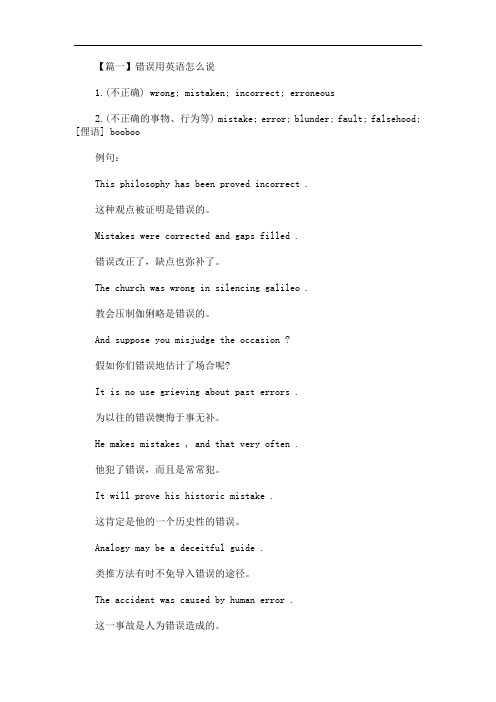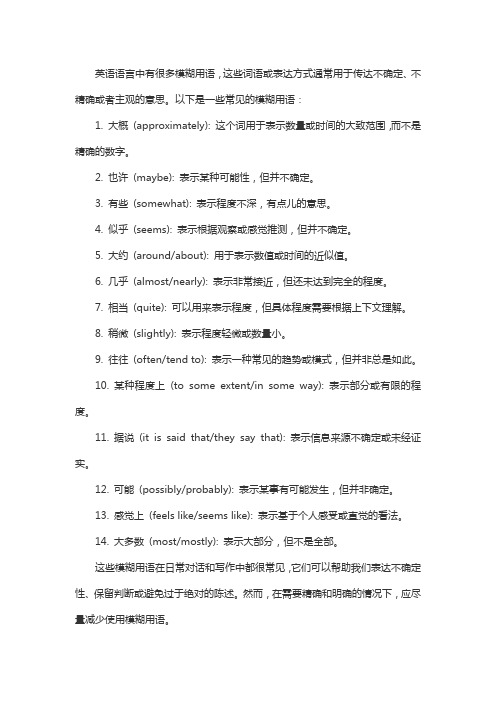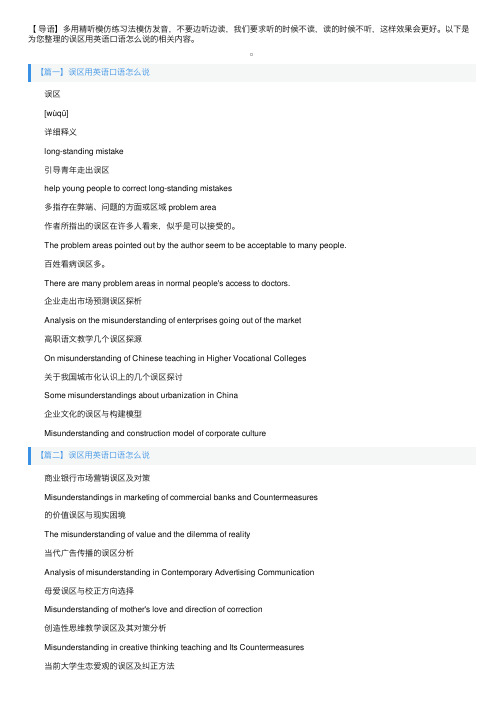最新误区用英语口语怎么说
英语学习中的常见口语误区

英语学习中的常见口语误区Common Oral Mistakes in English LearningIntroduction:English is widely spoken around the world and is an essential language for communication, both personally and professionally. However, non-native English speakers often encounter difficulties due to common oral mistakes that they make while learning and speaking English. In this article, we will explore some of these common oral mistakes and provide useful tips and strategies to overcome them.1. Pronunciation Errors:One of the most common mistakes in English speaking is mispronunciation. Non-native speakers often struggle with pronouncing certain sounds and stress patterns. For example, pronouncing the "th" sound as "s" or "z" can result in misunderstanding or confusion.To overcome this, it is important to actively listen to native English speakers, imitate their pronunciation, and practice regularly. Engaging in conversation with native speakers or joining pronunciation classes can also help improve pronunciation skills. Utilizing online resources, such as pronunciation videos or audio exercises, can be beneficial too.2. Verb Tenses and Sentence Structure:Another common oral mistake in English learning is incorrect verb tense usage and sentence structure. Non-native speakers often struggle withunderstanding and using different verb tenses accurately. This can lead to confusion and give the wrong impression during conversations.To overcome this, it is crucial to study and practice verb tenses, such as the past, present, and future tenses. Learning the correct sentence structure and word order is also important. Regularly reading English books, watching English movies or TV shows, and practicing speaking with fluent English speakers can significantly improve verb tense and sentence structure skills.3. Overusing Translation:Many non-native English speakers tend to rely heavily on translation while learning and speaking English. While translation can be helpful at times, overusing it can hinder language development and lead to unnatural-sounding sentences.To avoid this, it is recommended to immerse oneself in the English language as much as possible. Thinking and speaking in English without translating word for word can help develop fluency and enhance communication skills. Utilizing English-English dictionaries or language learning apps can also reduce the dependency on translation.4. Lack of Idiomatic Expressions:Non-native English speakers often struggle with using idiomatic expressions appropriately. Literal translations of expressions from their native language can result in confusion or misunderstanding.To overcome this, it is beneficial to learn and practice idiomatic expressions commonly used in English. Reading English literature, watching English movies or TV shows, and conversing with native English speakerscan expose learners to a wide range of idiomatic expressions. Using idioms in daily conversations and paying attention to their usage can help incorporate them naturally into one's spoken English.Conclusion:English learning can be a rewarding journey, but it is important to be aware of and overcome the common oral mistakes that non-native speakers often make. By focusing on pronunciation, verb tense usage, sentence structure, minimizing translation, and incorporating idiomatic expressions, learners can enhance their oral communication skills in English. Remember, practice, exposure to the language, and a positive attitude are key to overcoming these common oral mistakes and becoming fluent in English.。
容易误解的口语表达

英语口语里有很多地方都存在“字面含义陷阱”,我们在缺乏积累时,很容易根据字面的含义误解了表达的真实含义,以下列举两种非常常见的易误解的句型进行详细的思维分析:1. You can't be too careful in your work.你工作越仔细越好。
(易误解为:你工作不能太仔细);这是英语里最常见的一个误区,例如:You can't give him too much money.你给他再多的钱也不算多。
(易误解为:你不能给他太多钱)出现这样的误解的关键在于大家对于某些常用词的词义理解过于狭窄,以及中英文词义差异没有区别开来。
can在英语里体现的是一种能否达到某种目标、某个目的的能力,而中文里的“不能”是指“不可以、不应该”;因此这句话可以这样理解:你没有能力给他钱给到“toomuch”的程度,反过来说就是,你给他再多的钱也不为过。
2. All his friends did not turn up.他的朋友没全到。
(易误解为:他的朋友全部都没到)。
这个误区是英文里的完全否定和局部否定的区别,该句有多种表达方式:All his friends did not turn up=Not all his friends turn up=Someof his friends didn't turn up.也就说All ... not...或Not ... all...是一种局部否定表达,而不是完全否定。
但是很多人习惯性看到All翻译为“全部”,又看到didn't 翻译为“没有”,由此组成了“全部没有”这样的含义。
类似这种逐词翻译并组合成句意的阅读理解方式是绝大多数学习者出现误解、影响其阅读能力的最大障碍。
大家以后在阅读时一定要尽力避免这种阅读方式。
最新错误用英语口语怎么表达

【篇一】错误用英语怎么说1.(不正确) wrong; mistaken; incorrect; erroneous2.(不正确的事物、行为等) mistake; error; blunder; fault; falsehood; [俚语] booboo例句:This philosophy has been proved incorrect .这种观点被证明是错误的。
Mistakes were corrected and gaps filled .错误改正了,缺点也弥补了。
The church was wrong in silencing galileo .教会压制伽俐略是错误的。
And suppose you misjudge the occasion ?假如你们错误地估计了场合呢?It is no use grieving about past errors .为以往的错误懊悔于事无补。
He makes mistakes , and that very often .他犯了错误,而且是常常犯。
It will prove his historic mistake .这肯定是他的一个历史性的错误。
Analogy may be a deceitful guide .类推方法有时不免导入错误的途径。
The accident was caused by human error .这一事故是人为错误造成的。
【篇二】错误的英文是什么错误的英文:errormistakemistaken参考例句:Incorrectness of reasoning or belief;erroneousness. 错误推理或信仰上错误;错误Unknown Error未知的错误A false ideal错误的理想A lapse of memory;a lapse in judgment.记忆的错误;判断上的错误Incorrectness of reasoning or belief; erroneousness. 推理或信仰上错误;错误Garbage in, garbage out.错误的输入必然导致错误的输出。
26个中国式英语口语误区

26个中国式英语口语误区26个中国式英语口语误区在托福和雅思的口语中,考生很多时候在不知不觉中就被扣掉了一些分数,很大程度上是因为Chinglish作怪~1. 我非常喜欢它中国式:I very like it美国式:I like it very much。
这个错误基本上是每个人都会出错的,原因非常简单,就是因为在使用中文思维,然后翻译成简单的英语表达,这是非常危险的一个习惯。
2. 这个价格对我挺合适的中国式:The price is very suitable for me。
美国式:The price is right。
suitable(合适的、相配的)最常见的用法是以否定的形式出现在告示或通知上,如:下列节目儿童不宜。
The following programme is not suitable for children。
在这组句子中用后面的说法会更合适。
3. 你是做什么工作的呢?中国式:What’s your job?美国式:What’s your occupation?what’s your job?这种说法难道也有毛病吗?是的。
因为如果您的谈话对象刚刚失业,如此直接的问法会让对方有失面子,所以您要问:目前您是在上班吗?Are you working at the moment?接下来您才问:目前您在哪儿工作呢?Where are you working these days?或者您从事哪个行业呢?What line of work are you in? 最地道的是说Occupation. 顺带说一下,回答这类问题时不妨说得具体一点,不要只是说经理或者秘书4. 用英语怎么说?中国式:How to say?美国式:How do you say this in English?Note:How to say是在中国最为泛滥成灾的中国式英语之一,这决不是地道的英语说法。
同样的句子有:请问这个词如何拼写?How do you spell that please?请问这个单词怎么读?How do you pronounce this word?5. 明天我有事情要做中国式:I have something to do tomorrow?美国式:Sorry but I am tied up all day tomorrow。
英语学习中的常见口语误区及纠正方法

英语学习中的常见口语误区及纠正方法Common Oral Mistakes in English Learning and Correction MethodsOral communication plays a vital role in language learning, and it is crucial to be aware of common oral mistakes that learners often make in their English language journey. In this article, we will explore some frequently encountered oral mistakes and effective methods to correct them.1. Pronunciation Errors:One of the most challenging aspects of learning English is mastering its pronunciation. Learners often struggle with pronouncing certain sounds or words correctly. To overcome this, it is important to focus on phonetics and practice regularly.a) Mispronunciation of Vowels: Many non-native English speakers have difficulty distinguishing between similar vowel sounds, such as 'bed' and'bad.' To rectify this, learners can consult pronunciation guides or online resources that provide audio examples of different vowel sounds. Mimicking and practicing these sounds will significantly improve pronunciation accuracy.b) Intonation and Stress: Incorrect intonation and stress patterns can negatively impact communication. By being mindful of the stress placed on certain syllables or words within sentences, learners can sound more natural and fluent. Listening to native English speakers, joining conversation clubs, or working with a pronunciation coach can aid in developing the proper intonation and stress patterns.2. Grammar Mistakes:Grammar mistakes are common among English learners, leading to miscommunication or confusion. Addressing these errors early on can enhance language proficiency.a) Verb Tense Errors: Mixing up verb tenses or using incorrect ones is a common oral mistake. To tackle this, learners should familiarize themselves with proper verb conjugation rules. Regular practice, including exercises, conversational activities, and writing exercises, can help consolidate knowledge and improve accuracy.b) Subject-Verb Agreement: Many learners struggle with matching the subject and verb correctly in a sentence. Paying attention to the subject-verb agreement rules, such as using singular verbs with singular subjects and plural verbs with plural subjects, is crucial. Engaging in grammar drills and exercises can aid in internalizing these rules and avoiding mistakes.3. Vocabulary Choice:Selecting the appropriate vocabulary is vital for effective communication. However, learners often struggle with synonyms, idiomatic expressions, or colloquialisms, leading to confusion or incorrect usage.a) Limited Vocabulary: Expanding vocabulary through reading, watching movies or TV shows, listening to podcasts, and engaging in conversations with native English speakers can help learners overcome this hurdle. Building a well-rounded vocabulary arsenal will provide learners with a wider range of words and expressions to accurately convey their thoughts.b) Idiomatic Expressions: Idioms pose significant challenges for learners as their meanings cannot be deduced from individual words. Learning idioms in context and practicing their usage in conversations or writing can improve language fluency and understanding.c) Slang and Colloquial Language: Informal English, including slang and colloquial expressions, can be tricky for learners. Immersing oneself in English-speaking environments, such as watching movies or TV shows, can help learners grasp the nuances and idiomatic expressions commonly used in everyday conversations.In conclusion, overcoming common oral mistakes in English learning requires consistent practice, exposure to authentic materials, and a focus on pronunciation, grammar, and vocabulary. By addressing these areas and utilizing effective correction methods, learners can enhance their oral proficiency and achieve greater language fluency. Remember, practice makes perfect!。
英语语言中的模糊用语

英语语言中有很多模糊用语,这些词语或表达方式通常用于传达不确定、不精确或者主观的意思。
以下是一些常见的模糊用语:
1. 大概(approximately): 这个词用于表示数量或时间的大致范围,而不是精确的数字。
2. 也许(maybe): 表示某种可能性,但并不确定。
3. 有些(somewhat): 表示程度不深,有点儿的意思。
4. 似乎(seems): 表示根据观察或感觉推测,但并不确定。
5. 大约(around/about): 用于表示数值或时间的近似值。
6. 几乎(almost/nearly): 表示非常接近,但还未达到完全的程度。
7. 相当(quite): 可以用来表示程度,但具体程度需要根据上下文理解。
8. 稍微(slightly): 表示程度轻微或数量小。
9. 往往(often/tend to): 表示一种常见的趋势或模式,但并非总是如此。
10. 某种程度上(to some extent/in some way): 表示部分或有限的程度。
11. 据说(it is said that/they say that): 表示信息来源不确定或未经证实。
12. 可能(possibly/probably): 表示某事有可能发生,但并非确定。
13. 感觉上(feels like/seems like): 表示基于个人感受或直觉的看法。
14. 大多数(most/mostly): 表示大部分,但不是全部。
这些模糊用语在日常对话和写作中都很常见,它们可以帮助我们表达不确定性、保留判断或避免过于绝对的陈述。
然而,在需要精确和明确的情况下,应尽量减少使用模糊用语。
误区用英语口语怎么说

【导语】多⽤精听模仿练习法模仿发⾳,不要边听边读,我们要求听的时候不读,读的时候不听,这样效果会更好。
以下是为您整理的误区⽤英语⼝语怎么说的相关内容。
【篇⼀】误区⽤英语⼝语怎么说 误区 [wùqū] 详细释义 long-standing mistake 引导青年⾛出误区 help young people to correct long-standing mistakes 多指存在弊端、问题的⽅⾯或区域 problem area 作者所指出的误区在许多⼈看来,似乎是可以接受的。
The problem areas pointed out by the author seem to be acceptable to many people. 百姓看病误区多。
There are many problem areas in normal people's access to doctors. 企业⾛出市场预测误区探析 Analysis on the misunderstanding of enterprises going out of the market ⾼职语⽂教学⼏个误区探源 On misunderstanding of Chinese teaching in Higher Vocational Colleges 关于我国城市化认识上的⼏个误区探讨 Some misunderstandings about urbanization in China 企业⽂化的误区与构建模型 Misunderstanding and construction model of corporate culture【篇⼆】误区⽤英语⼝语怎么说 商业银⾏市场营销误区及对策 Misunderstandings in marketing of commercial banks and Countermeasures 的价值误区与现实困境 The misunderstanding of value and the dilemma of reality 当代⼴告传播的误区分析 Analysis of misunderstanding in Contemporary Advertising Communication 母爱误区与校正⽅向选择 Misunderstanding of mother's love and direction of correction 创造性思维教学误区及其对策分析 Misunderstanding in creative thinking teaching and Its Countermeasures 当前⼤学⽣恋爱观的误区及纠正⽅法 Misunderstanding and correction of current college students' Outlook on love 何时我才能⾛出⽣命的误区呢? When can I get out of the misunderstanding of life?【篇三】误区⽤英语⼝语怎么说 注意⼒经济模式的误区在哪⾥ Where is the misunderstanding of the attention economy mode? 误区⼆.单⾝是⼀段等待的时期。
英语口语:误区!和native speaker交流,才能学好英语?

美联英语提供:误区:和native speaker交流,才能学好英语?两分钟做个小测试,看看你的英语水平/test/waijiao.aspx?tid=16-73675-0在学英语的时候,你是不是经常会被告知要这样做:想学好英语(尤其是口语),你就一定要多和native English speakers(英语母语的人)沟通。
这个观点受到了很多英语学习者的追捧,甚至都要赶超“出国留学”的观念了!那么这个观点正确吗?和什么样的native speakers交流,才能提高英语?今天,英语君就来和你好好说说。
1.和native speakers交流,对学英语有帮助?Why do we think this is true? Well, it seems logical.Many believe that the language belongs to the native speakers, so if we want to speak it ‘correctly’we must speak English with them, right?However, this idea is a barrier to the reality that languages are not so black and white. Especially English because it is the global language for communication.同英语母语者对话真的对学习英语有帮助吗?逻辑上似乎是合理的。
很多人认为如果想地道地说英语,当然要同英语母语者对话,因为英语母语者创造并一直在使用英语。
但,语言运用没有明确的对错之分,尤其是作为国际通用语——英语。
Languages are fluid and evolving. There is no perfect way to speak them. Native speakers bend the rules, and usually we do NOT care if learners make mistakes, as语言是多变的,在不断进化。
- 1、下载文档前请自行甄别文档内容的完整性,平台不提供额外的编辑、内容补充、找答案等附加服务。
- 2、"仅部分预览"的文档,不可在线预览部分如存在完整性等问题,可反馈申请退款(可完整预览的文档不适用该条件!)。
- 3、如文档侵犯您的权益,请联系客服反馈,我们会尽快为您处理(人工客服工作时间:9:00-18:30)。
【篇一】误区用英语口语怎么说
误区
[wùqū]
详细释义
long-standing mistake
引导青年走出误区
help young people to correct long-standing mistakes
多指存在弊端、问题的方面或区域 problem area
作者所指出的误区在许多人看来,似乎是可以接受的。
The problem areas pointed out by the author seem to be acceptable to many people.
百姓看病误区多。
There are many problem areas in normal people's access to doctors.
企业走出市场预测误区探析
Analysis on the misunderstanding of enterprises going out of the market
高职语文教学几个误区探源
On misunderstanding of Chinese teaching in Higher Vocational Colleges
关于我国城市化认识上的几个误区探讨
Some misunderstandings about urbanization in China
企业文化的误区与构建模型
Misunderstanding and construction model of corporate culture
【篇二】误区用英语口语怎么说
商业银行市场营销误区及对策
Misunderstandings in marketing of commercial banks and Countermeasures
的价值误区与现实困境
The misunderstanding of value and the dilemma of reality
当代广告传播的误区分析
Analysis of misunderstanding in Contemporary Advertising Communication
母爱误区与校正方向选择
Misunderstanding of mother's love and direction of correction
创造性思维教学误区及其对策分析
Misunderstanding in creative thinking teaching and Its Countermeasures
当前大学生恋爱观的误区及纠正方法
Misunderstanding and correction of current college students' Outlook on love
何时我才能走出生命的误区呢?
When can I get out of the misunderstanding of life?
【篇三】误区用英语口语怎么说
注意力经济模式的误区在哪里
Where is the misunderstanding of the attention economy mode?
误区二.单身是一段等待的时期。
Myth two. Being single is a waiting period.
射线认识中的常见误区及防护措施
Common misunderstandings and preventive measures in radiographic cognition
船舶超载调查的误区及正确方法
Misunderstandings and correct methods of overload investigation of ships
误区:寻找不正确的输入
Misunderstanding: finding incorrect input
大学英语分级教学中的误区及建议
Misunderstandings and suggestions in Graded Teaching of College English
简略说明了走出误区的关键之处。
Briefly explain the key points to get out of the misunderstanding.
交际语言教学实施中存在的误区述评
A review of misunderstandings in the implementation of Communicative Language Teaching。
